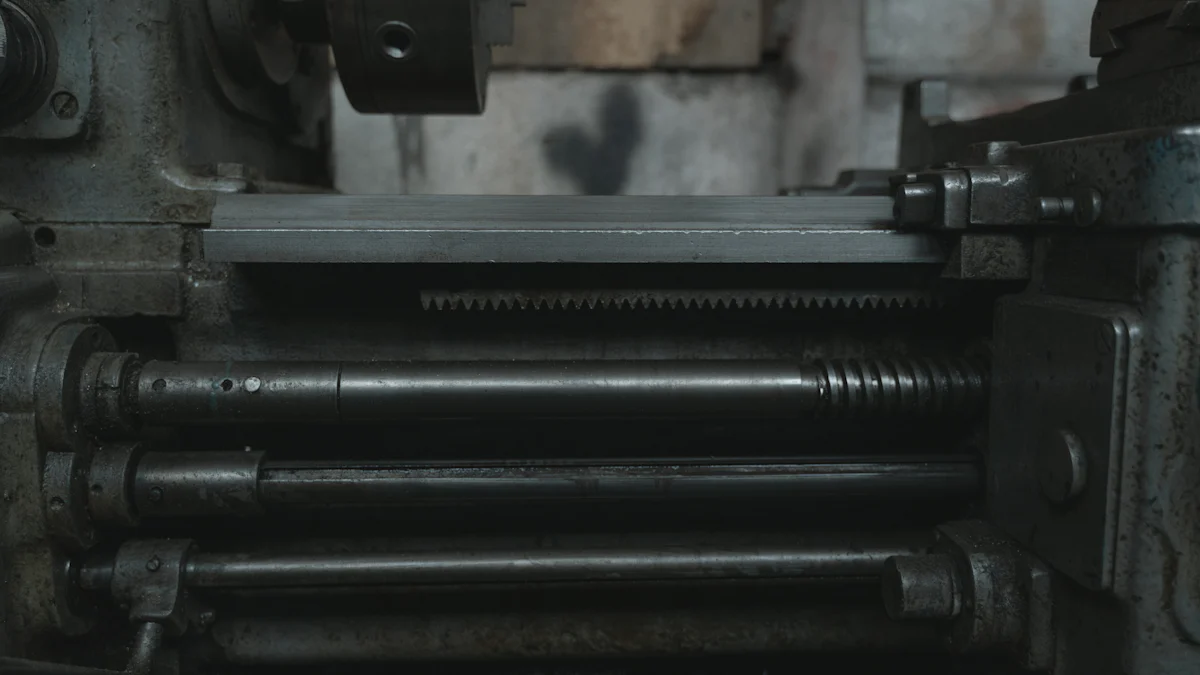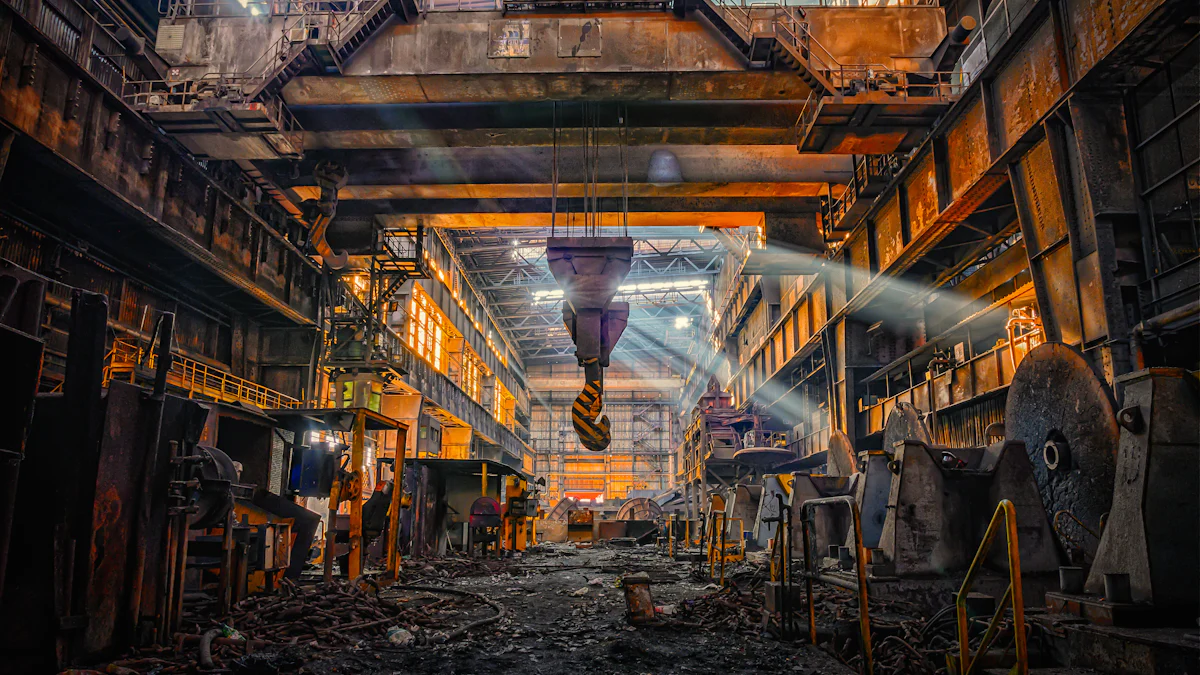
News
You will find Canroon's induction heating machine for forging revolutionizing modern forging. These machines offer precise control and rapid heating, enhancing product quality while reducing energy costs. The induction heating machine for forging provides faster and more energy-efficient solutions compared to traditional methods. They ensure uniform heating, minimizing scale formation and oxidation. The Heating Induction Forging Machine stands out for its safety and cleanliness, making it a preferred choice in the industry. By using an Induction Heat Machine For Casting Forging, you benefit from improved efficiency and a cleaner working environment.
Key Takeaways
Induction heating machines significantly reduce heating time, enhancing productivity and throughput in forging processes.
These machines are highly energy-efficient, converting up to 80% of energy into useful heat, leading to substantial cost savings and environmental benefits.
Precise temperature control allows for optimal heating, improving the quality of forged products and reducing defects.
Induction heating ensures uniform heat distribution, resulting in consistent material characteristics and repeatable results.
The technology enhances workplace safety by eliminating open flames and reducing the risk of burns and accidents.
Canroon's advancements in induction heating technology focus on automation and smart systems, improving efficiency and reducing human error.
Future developments in induction heating will prioritize sustainability, further minimizing energy consumption and environmental impact.
How Induction Heating Machines Work for Forging

Understanding how an induction heating machine for forging operates can significantly enhance your knowledge of modern forging techniques. These machines utilize advanced principles and components to deliver precise and efficient heating solutions.
Principles of Induction Heating
Electromagnetic Induction
Electromagnetic induction forms the core of how induction heating machines function. When you pass an alternating current through a coil, it generates a magnetic field. This field induces electrical currents within the metal workpiece, causing it to heat up. The process is contactless, ensuring that the metal heats uniformly and efficiently.
Hysteresis and Eddy-Current Losses
In addition to electromagnetic induction, hysteresis and eddy-current losses contribute to the heating process. Hysteresis loss occurs when the magnetic domains within the metal align with the alternating magnetic field, generating heat. Eddy-current losses arise from the induced currents circulating within the metal, further increasing the temperature. These mechanisms work together to provide rapid and controlled heating.
Key Components of Induction Heating Machines
Inductor Coil
The inductor coil is a crucial component of any induction heating machine for forging. It is typically made of copper tubing, which is shaped to fit around the workpiece. The coil's design and size determine the efficiency and effectiveness of the heating process. By adjusting the coil, you can control the heating pattern and intensity, ensuring optimal results for different forging applications.
Power Supply and Control System
The power supply and control system are vital for the operation of induction heating machines. The power supply delivers the necessary electrical energy to the coil, while the control system manages the frequency and power levels. This setup allows you to precisely control the heating process, ensuring consistent and repeatable results. Advanced models, like the Canroon CR2000 Induction Heating Machine, offer features such as overload protection and operational control, enhancing reliability and performance.
By understanding these principles and components, you can appreciate the sophistication and efficiency of induction heating machines in forging. These machines not only improve the quality of forged products but also contribute to a cleaner and safer working environment.
Advantages of Induction Heating in Forging
 Image Source: unsplash
Image Source: unsplash
Induction heating machines for forging offer numerous advantages that enhance the efficiency, precision, and safety of the forging process. Understanding these benefits can help you appreciate why this technology is becoming a preferred choice in the industry.
Efficiency and Speed
Reduced Heating Time
Induction heating machines for forging significantly reduce heating time. Unlike traditional methods that rely on external heat sources, induction heating generates heat directly within the metal. This direct approach minimizes heat loss and accelerates the heating process. You can achieve the desired temperature in a fraction of the time, increasing productivity and throughput.
Energy Efficiency
Energy efficiency is a hallmark of induction heating. These machines convert up to 80% of the energy consumed into useful heat. This high conversion rate translates into substantial cost savings. By minimizing energy waste, you not only reduce operational costs but also contribute to environmental sustainability. The adoption of induction heating aligns with global efforts to promote energy-efficient technologies.
Precision and Control
Temperature Control
Induction heating machines for forging provide unparalleled temperature control. You can precisely adjust the heating parameters to suit specific forging requirements. This level of control ensures that the metal reaches the optimal temperature for deformation without overheating. Precise temperature management enhances the quality of the forged products, reducing defects and improving material properties.
Consistency in Heating
Consistency is crucial in forging applications. Induction heating delivers uniform heat distribution across the workpiece. This uniformity prevents localized overheating and ensures consistent material characteristics throughout the product. With induction heating, you achieve repeatable results, enhancing the reliability and quality of your forged components.
Environmental and Safety Benefits
Reduced Emissions
Induction heating systems produce fewer emissions compared to traditional heating methods. The absence of open flames and combustion processes eliminates the release of harmful gases and particulates. This reduction in emissions contributes to a cleaner working environment and aligns with regulatory standards for air quality and environmental protection.
Improved Workplace Safety
Safety is a top priority in any industrial setting. Induction heating machines enhance workplace safety by eliminating the risks associated with open flames and hot surfaces. The contactless heating process reduces the likelihood of burns and accidents. Additionally, the quiet operation of induction systems minimizes noise pollution, creating a more comfortable and safer work environment for operators.
By leveraging the advantages of induction heating machines for forging, you can optimize your forging operations. These machines offer a combination of speed, efficiency, precision, and safety that traditional methods cannot match. As the industry continues to evolve, induction heating stands out as a forward-thinking solution that meets the demands of modern forging.
Innovations and Future Developments in Induction Heating
Canroon's Contributions to Induction Heating
Technological Advancements
Canroon has been at the forefront of technological advancements in induction heating. You will find that their systems incorporate cutting-edge features that enhance performance and efficiency. These advancements include the development of high-frequency induction heating solutions that deliver localized, non-contact heat. This approach results in fewer rejects, less scrap, and reduced energy costs. By focusing on precision and control, Canroon's technology minimizes product distortion and maximizes material integrity.
Industry Applications
The versatility of Canroon's induction heating technology extends across various industry applications. You can see its impact in sectors such as automotive, aerospace, and manufacturing. In these industries, induction heating is used for tasks like hardening, brazing, and annealing. The technology's ability to provide fast and uniform heating makes it ideal for processing advanced engineering materials. As industries continue to evolve, Canroon's solutions offer a reliable and efficient method for meeting modern production demands.
Future Trends in Induction Heating Technology
Automation and Smart Systems
The future of induction heating technology is closely tied to automation and smart systems. You will notice a trend towards integrating advanced control systems that allow for real-time monitoring and adjustments. These smart systems enhance the precision of the heating process, ensuring optimal results with minimal human intervention. Automation not only improves efficiency but also reduces the potential for errors, leading to higher quality outcomes.
Sustainability and Energy Efficiency
Sustainability and energy efficiency are key drivers in the evolution of induction heating technology. You will find that future developments focus on reducing energy consumption and minimizing environmental impact. Induction heating is inherently energy-efficient, converting a significant portion of consumed energy into useful heat. This efficiency aligns with global efforts to promote sustainable practices. By adopting induction heating, you contribute to a cleaner environment and support the transition to greener industrial processes.
In conclusion, the innovations and future developments in induction heating technology promise to transform the industry. With Canroon leading the charge, you can expect continued advancements that enhance efficiency, precision, and sustainability. As these technologies evolve, they will play a crucial role in shaping the future of modern forging and beyond.
Induction heating plays a pivotal role in modern forging, offering you a sustainable and energy-efficient solution. By utilizing Canroon's advanced technology, you gain numerous benefits, including precise control, rapid heating, and enhanced safety. These advantages make induction heating a preferred choice across various industries, such as automotive and aerospace. Looking ahead, the potential for future developments in this technology is immense. You can expect further innovations that will enhance efficiency and sustainability, solidifying induction heating's position as a green technology with significant environmental and economic benefits.
Please give us a message